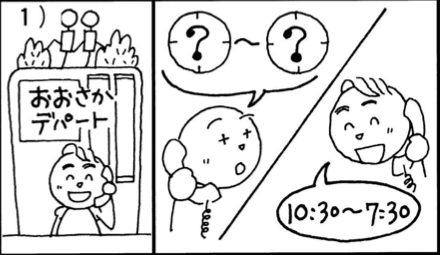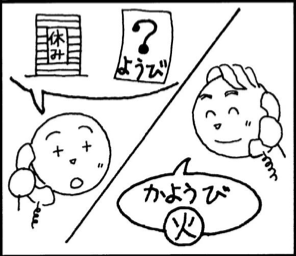Recap on “from ~ to ~”:
Q:
From what time to what time is your class? | Kurasu wa nan ji kara nanji made desu ka? | クラス は なんじ から なんじ まで です か。
– – – – – – – From 9.30 to 11.30. | Kuji han kara juuichi ji made desu. | くじ はん から じゅういちじ はん まで です。

Q: From what time to what time does Osaka Department Store open? | Oosaka depato wa nanji kara nanji made desu ka? | おおさか デパト は なんじ から なんじ まで です か。
– – – – – – – 10.30 to 7.30. | Juuji han kara shichiji han made desu. | じゅうじ はん から しちじ まで です。
The following section is on days in a week. We also learnt the different time markers, like morning, AM, evening, tomorrow, the day before etc.
ASKING ABOUT BREAK

Q:
What day is the off day? | Yasumi wa nan youbi desu ka? | やすみはなんようびですか。
– – – – – – – Tuesday. | Kayoubi desu. | かようび です。
DAYS IN A WEEK

DAY MARKERS
The day before yesterday | Ototoi | おととい
Yesterday | Kinou | きのう
Today | Kyou | きょう
Tomorrow | Ashita | あした
The day after tomorrow | Asatte | あさって
***きのう は かようび でした。’Deshita’ is used because the word ‘kinou’ refers to past tense.
DESCRIBING DAILY ACTIVITIES WITH TIME MARKERS
Verbs/ action words have an added ‘masu’ at the end [a list of vocabulary for daily activities are in the Vocabulary section]. The rule for negative, positive, present and past apply. Read more under the Vocab tab.
 From this illustration, we can make two kinds of statements. One uses the particle ‘kara’ and ‘made’; this is a continuous statement. The other uses the particle ‘ni’; this is a momentary statement, used at the particular point in time.
From this illustration, we can make two kinds of statements. One uses the particle ‘kara’ and ‘made’; this is a continuous statement. The other uses the particle ‘ni’; this is a momentary statement, used at the particular point in time.
For the following examples we will use the time marker ‘everyday | mainichi | まいにち’. Thus the sentence will be in present tense.
1. Time + Verb Continuous Statement
Everyday I sleep from 11pm to 6am. | Mainichi juuichi ji kara roku ji made nemasu. | まいにち 11じ から 6じ まで ねます。
Everyday I study from 8am to 12pm. | Mainichi hachi ji kara juuni ji made benkyoushimasu. | まいにち 8じ から 12じ まで べんきょうします。
2. Time + Verb Momentary Statement
Every morning I wake up at 6am. | Maiasa roku ji ni okimasu. | まいあさ 6じ に おきます。
Everyday Japanese class starts at 2pm. | Mainichi nihongo no kurasu wa ni ji ni hajimarimasu. | まいにち にほんご の クラス は 2じ に はじまります。
The verbs are always structured last, at the end of the sentence.






 From this illustration, we can make two kinds of statements. One uses the particle ‘kara’ and ‘made’; this is a continuous statement. The other uses the particle ‘ni’; this is a momentary statement, used at the particular point in time.
From this illustration, we can make two kinds of statements. One uses the particle ‘kara’ and ‘made’; this is a continuous statement. The other uses the particle ‘ni’; this is a momentary statement, used at the particular point in time.